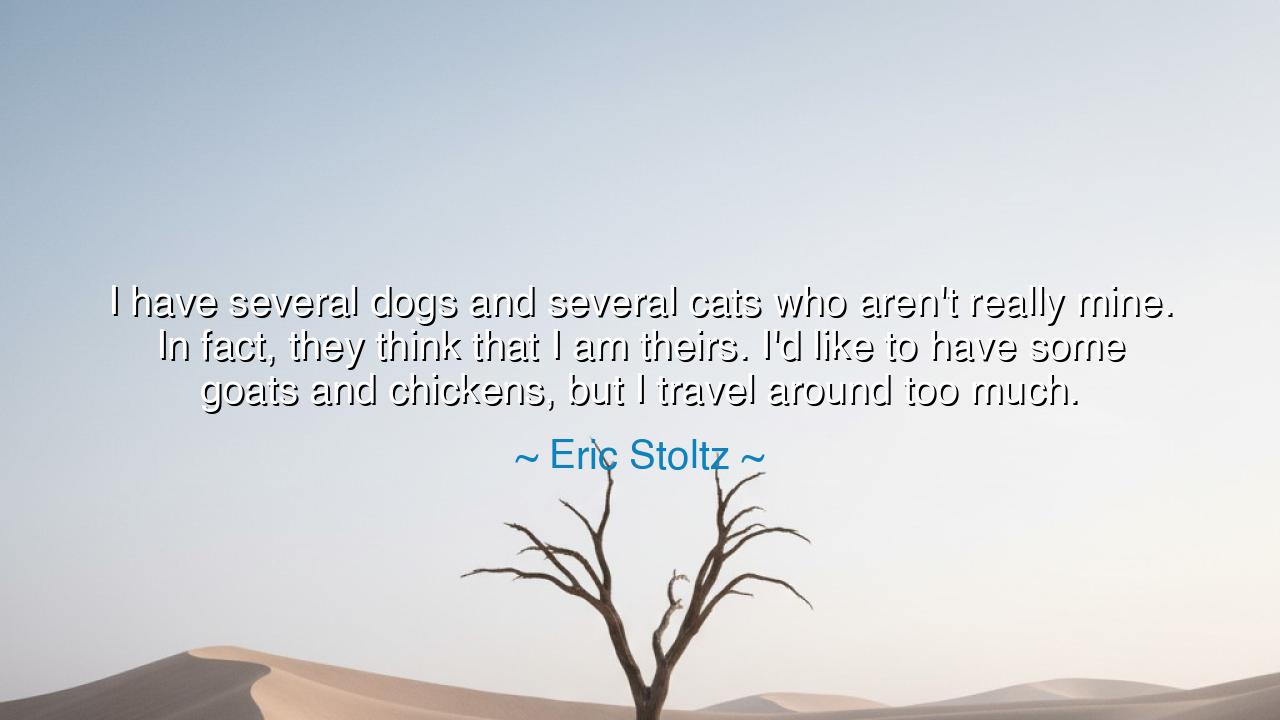
I have several dogs and several cats who aren't really mine. In
I have several dogs and several cats who aren't really mine. In fact, they think that I am theirs. I'd like to have some goats and chickens, but I travel around too much.






Eric Stoltz, actor and wanderer of many roles, once spoke with a quiet and almost humorous humility: “I have several dogs and several cats who aren't really mine. In fact, they think that I am theirs. I'd like to have some goats and chickens, but I travel around too much.” On the surface, it seems but a light reflection on pets and the impossibility of farming life for one who journeys often. Yet when weighed with the wisdom of the ancients, these words unveil a deeper truth about belonging, responsibility, and the limits of human desire. For in them lies the paradox of companionship: that we do not always possess those we love, but are possessed by them, and that the restless life of travel often pulls us away from the roots we long to plant.
The dogs and cats Stoltz speaks of remind us that ownership is an illusion. In truth, it is they who claim us, who look to us for sustenance, warmth, and care. This inversion of roles reflects an ancient wisdom—that in all bonds, whether with animals or people, it is not dominance but mutual devotion that defines the relationship. As Aristotle himself noted, friendship is not about utility but about recognition of soul. Stoltz, in his humility, acknowledges that his companions see him not as master, but as kin.
Yet his yearning for goats and chickens speaks of something more: the human desire for rootedness, for the simple life close to the soil, where animals and man labor together in harmony. From the dawn of civilization, livestock and farming tethered humanity to the earth, offering stability and sustenance. To long for such creatures is to long for permanence, for a return to the rhythm of dawn and dusk, of seasons and harvests. But he admits that this dream is hindered by travel, that ceaseless wandering which makes deep-rooted bonds harder to sustain.
History is filled with this tension. Consider the life of Odysseus, who longed for his home in Ithaca even as he wandered across seas, entangled in the snares of gods and wars. His goats, his hearth, his faithful Penelope—all were denied to him for twenty long years. The traveler gains wisdom and story, but loses the daily intimacy of tending soil and beasts. Stoltz echoes this eternal conflict: the wanderer cannot fully be the shepherd, for the road claims too much of him.
And yet, the lesson is not despair but balance. Stoltz’s words teach us that life requires recognition of our limits. We cannot hold every dream in our hands at once. To travel is to sacrifice rootedness; to root oneself is to sacrifice the wanderer’s freedom. To love animals, as Stoltz does, is to accept that sometimes they are not ours to fully claim, but rather beings who claim pieces of us in passing. Wisdom lies in gratitude—in cherishing the bonds we can sustain, rather than lamenting those beyond our grasp.
The story also teaches the importance of responsibility. It would be easy to desire goats and chickens, but Stoltz acknowledges that his absence would make their care unjust. In this honesty lies virtue: he chooses not to take what he cannot tend. This recalls the Stoic teaching that the good life is not the life of indulged desires, but of rightly ordered ones. To refrain from claiming what we cannot nurture is itself an act of compassion.
Thus, the practical lesson shines clear: cherish those who claim you, whether animals, friends, or family, and recognize the limits of your own life’s rhythm. Do not seek to hold all paths at once, but walk the one that is truly yours with honesty and care. If you are a traveler, embrace the light companionships that come; if you are rooted, embrace the deeper ties of field and flock. Both are noble, so long as they are chosen with wisdom.
So we return to Stoltz’s gentle words: “They think that I am theirs… but I travel around too much.” They remind us that we belong to those we love, even more than they belong to us, and that every life is a weaving of longing and limit. Let us, then, live with gratitude for the companions we do have, with honesty about the duties we can bear, and with reverence for the truth that every bond—whether with beast or human—is not about ownership, but about love freely given and faithfully sustained.






AAdministratorAdministrator
Welcome, honored guests. Please leave a comment, we will respond soon